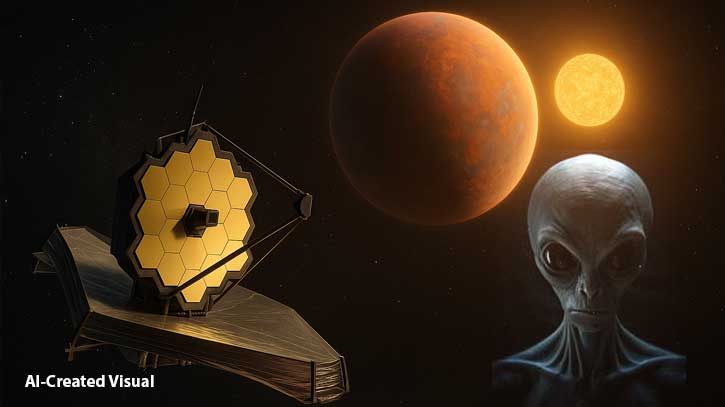This isn’t a scene from a sci-fi movie. Scientists using NASA’s James Webb Space Telescope have recently discovered potential signs of life on a planet beyond our solar system—K2-18b. Since the announcement, the world has been buzzing. Many are calling this a potentially groundbreaking discovery. So, have we really found aliens?
A team of researchers from the University of Cambridge, UK, identified the planet K2-18b, located 124 light-years away from Earth. The planet orbits a red dwarf star and is 8.6 times heavier and 2.6 times larger than Earth. Most importantly, it lies in the star’s “habitable zone”—a region where the planet is neither too hot nor too cold, allowing water to exist in liquid form. Earth, too, lies in such a zone around the Sun.
In further investigations of K2-18b, researchers found two specific gases in its atmosphere—dimethyl sulfide (DMS) and dimethyl disulfide (DMDS). These gases are known to occur only on Earth and are produced exclusively by living organisms, especially microscopic marine algae. In short, these compounds originate only from biological sources.
Although lead researcher Nikku Madhusudhan stops short of confirming alien life, he states that this is the first time signs of life resembling algae or bacteria have been found outside Earth.
“We’ve found possible evidence of biological activity on an exoplanet. This is a major breakthrough in the search for life beyond our solar system. Not only could this planet be habitable, but our existing technologies are now capable of detecting biosignatures in exoplanet atmospheres around nearby stars. This is a huge leap forward.”
Since the 1990s, more than 5,800 exoplanets have been identified. Some of them show signs of liquid water. But until now, no planet has shown such strong potential evidence of life. The James Webb Telescope has detected DMS and DMDS with 99.7% certainty. These gases cannot be produced through non-biological processes.
“This is an incredibly important and groundbreaking discovery. But we must proceed with caution. This touches on one of the deepest questions in human history. We want to be certain that we have truly found signs of life. More research and observation are needed.”
This discovery is being seen as a revolutionary moment in space exploration. Although researchers urge further confirmation, this may bring us closer to answering one of humanity’s oldest questions:
“Are we alone in the universe?”

